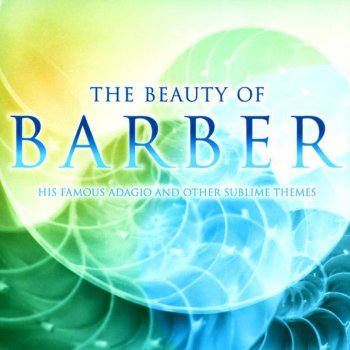Adagio for Strings - from String Quartet Op. 11 - Samuel Barberперевод на английский
Самуэль
Барбер
Samuel
Barber
(1910
- 1981)
(1910
- 1981)
Умирая,
он
вряд
ли
думал
о
своей
жизни
с
удовлетворением.
When
he
died,
he
hardly
thought
about
his
life
with
satisfaction.
Впрочем,
кто
знает...
However,
who
knows...
После
провала
своей
оперы
"
After
the
failure
of
his
opera
"
Антоний
и
Клеопатра"
он
почти
удалился
от
музыки.
Anthony
and
Cleopatra"
he
almost
retired
from
music.
Его
произведения
не
играли,
он
был
почти
забыт
при
жизни.
His
works
were
not
played,
he
was
almost
forgotten
during
his
lifetime.
Барбера
никогда
не
любили
другие
композиторы,
его
современники.
Barber
was
never
liked
by
other
composers,
his
contemporaries.
Может
быть,
это
связано
с
тем,
что
он
никогда
не
выдвигал
"манифестов".
Maybe
this
is
due
to
the
fact
that
he
has
never
put
forward
"manifestos".
Он
всё
время
находился
в
поиске,
писал
на
грани
эксперимента,
не
боялся
сочетать,
казалось
бы,
"старомодные,
устаревшие"
приёмы
с
непривычными
диссонансами
и
ангармонизмом.
He
was
always
on
the
lookout,
writing
on
the
verge
of
experimentation,
not
afraid
to
combine,
it
would
seem
that
"old-fashioned,
outdated"
techniques
with
unusual
dissonances
and
anharmonism.
И,
в
то
же
время,
оставался
в
стороне
от
"музыкальной
политики",
не
вмешиваясь
в
бушевавшие
тогда
споры
о
"новой
музыке"
и
будущем
искусства...
And,
at
the
same
time,
he
remained
aloof
from
the
"musical
politics",
not
interfering
in
the
raging
then
the
debate
about
"new
music"
and
the
future
of
art...
В
результате,
он
оказался
один
между
враждующими
лагерями,
между
упрёками
в
рутинности
с
одной
стороны
и
обвинениями
в
бессмысленности
с
другой...
As
a
result,
he
found
himself
alone
between
the
warring
camps,
between
accusations
of
routine
with
on
the
one
hand,
and
accusations
of
senselessness
on
the
other...
Ему
приклеили
вывеску
"неоромантиста".
The
sign
"neo-romanticist"
was
pasted
to
him.
Никто
не
знал,
что
это
значит,
но
звучало
очень
обидно.
No
one
knew
what
it
meant,
but
it
sounded
very
insulting.
Это
была
почти
уверенность
в
бесперспективности
дальнейших
исканий...
It
was
almost
a
certainty
of
the
futility
of
further
searches...
На
его
судьбу
можно
смотреть
с
двух
различных
позиций.
His
fate
can
be
viewed
from
two
different
perspectives.
Можно
сказать
- этот
человек
не
смог
ничего
добиться.
You
can
say
that
this
man
could
not
achieve
anything.
Всю
жизнь
он
писал
музыку,
сочинял,
мучался,
- концерты,
симфонии,
оперы,
балеты.
All
his
life
he
wrote
music,
composed,
suffered
- concerts,
symphonies,
operas,
ballets.
И
все
усилия
пропали
даром.
And
all
the
efforts
were
in
vain.
Он
не
оставил
школы.
He
didn't
leave
school.
Оперы
не
ставятся,
мелодии
прочно
забыты...
Operas
are
not
staged,
melodies
are
firmly
forgotten...
И
уже
само
имя
затерялось
где-то
в
годах
- бьюсь
об
заклад,
что
ты,
читатель,
никогда
не
слышал
этой
фамилии
- Барбер.
And
the
name
itself
has
already
been
lost
somewhere
in
the
years
- I
bet
that
you,
the
reader,
will
never
I've
heard
of
this
name
- Barber.
Ну
кто
такой
Барбер?
Well,
who
is
Barber?
Очередной
неудачник?
Another
loser?
Звучит
почти
нелепо.
It
sounds
almost
ridiculous.
Я
скажу
по
секрету
--
одно
его
произведение
всё-таки
помнят,
всё-таки
играют,
но,
Боже
мой,
как
это
скучно
- всегда
только
одно...
I'll
tell
you
a
secret
- one
of
his
works
is
still
remembered,
still
played,
but,
my
God,
how
boring
it
is
- there
is
always
only
one
thing...
Так
не
зря
ли
прожита
жизнь,
если
из
всех
долгих
лет
можно
было
бы,
в
принципе,
оставить
только
9 минут?
So
isn't
life
lived
in
vain
if,
of
all
the
long
years,
it
would
be
possible,
in
principle,
to
leave
Only
9 minutes?
Те
9 минут,
нужные
человеку,
чтобы
"услышать"
эту
единственную
мелодию
и
успеть
записать
её?
Those
9 minutes
it
takes
for
a
person
to
"hear"
this
single
melody
and
have
time
to
record
it?
Но
можно
взглянуть
на
дело
иначе.
But
you
can
look
at
it
differently.
Его
"
His
"
Адажио
для
струнных"
вошло
в
20ку
произведений
тысячелетия.
Adagio
for
strings"
was
included
in
the
top
20
works
of
the
millennium.
В
США
это
произведение
до
сих
пор
остаётся
музыкальным
бестселлером,
как
выдержавшее
наибольшее
количество
переизданий
на
компакт-дисках.
In
the
USA,
this
work
still
remains
a
musical
bestseller,
as
it
has
withstood
the
largest
number
of
CD
reissues.
Его
неизменно
играют
на
похоронах
всех
значительных
лиц
Америки.
It
is
invariably
played
at
the
funerals
of
all
significant
people
in
America.
Президентов,
например.
Presidents,
for
example.
Эту
мелодию
знают
почти
все
(или,
по
крайней
мере,
очень
многие).
Almost
everyone
knows
this
tune
(or
at
least
a
lot
of
people
do).
Не
помня,
правда,
зачастую
имени
композитора...
Not
remembering,
however,
often
the
name
of
the
composer...
Её
можно
встретить
на
самых
разных
записях
- саундтреках
к
фильмам,
театральным
постановкам,
в
выступлении
неизвестного
органиста,
в
концертных
бисах...
She
can
be
found
on
a
variety
of
recordings
- film
soundtracks,
theatrical
performances,
in
the
performance
of
an
unknown
organist,
in
concert
encores...
И
можно
с
уверенностью
заявить
- Самюэлю
Барберу
удалось
написать
нечто,
принадлежащее
вечности.
And
it's
safe
to
say
that
Samuel
Barber
managed
to
write
something
that
belongs
to
forever.
Нечто,
что
не
забылось,
когда
имя
его
уже
почти
забыто.
Something
that
was
not
forgotten
when
his
name
was
almost
forgotten.
Музыку,
которую
будут
играть,
когда
последняя
память
о
тех,
кто
с
оркестром
уходил
на
кладбище,
рассеется
как
дым...
The
music
that
will
be
played
when
the
last
memory
of
those
who
went
with
the
orchestra
to
The
cemetery
will
dissipate
like
smoke...
Сам
он,
видимо,
прекрасно
понимал,
что
однажды
из-под
пера
у
него
вышло
нечто,
ему
не
принадлежащее.
He
himself,
apparently,
understood
perfectly
well
that
one
day
something
came
out
from
under
his
pen,
he
did
not
owned.
Оцените перевод

Внимание! Не стесняйтесь оставлять отзывы.